Listening to unheard Wu-Tang Clan - the world's rarest album
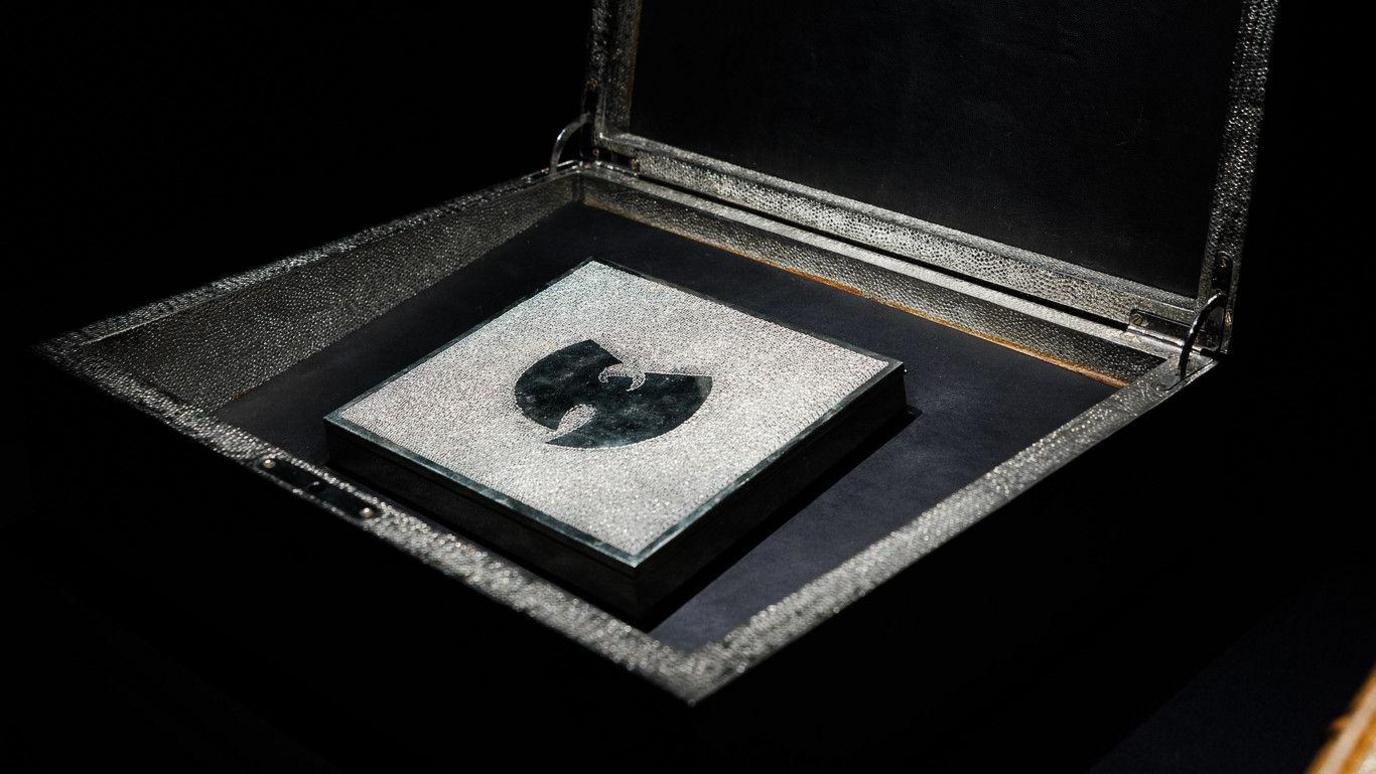
Once Upon a Time in Shaolin housed in a silver box on display in the museum
- Published
Inside a delicately hand-carved silver box on display in an Australian museum lies the most exclusive, most valuable, and perhaps most infamous album in the world.
And this weekend, I became one of the lucky few on the planet to have heard it.
Recorded in secret over six years by trailblazing hip-hop group the Wu-Tang Clan, Once Upon a Time in Shaolin was designed to be a piece of fine art.
Only a single CD copy exists – and with it comes a legal stipulation that the owner cannot publicly release the 31 tracks until 2103.
The record, which features the nine surviving members of the group, is currently on loan to Tasmania’s Museum of Old and New Art (Mona) – a gallery so well known for its headline-catching art some dub it Australia’s “Temple of Weird”.
First conceived during the pandemic, the museum’s new Namedropping exhibition explores why humans chase things that signal status and notoriety.
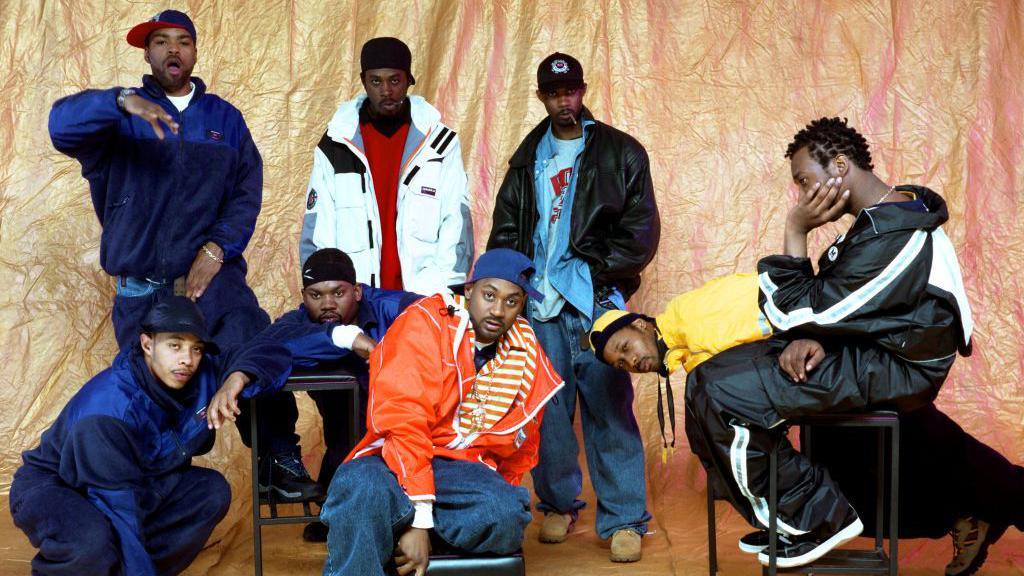
Wu-Tang Clan's unique flavour of hip-hop revolutionised the genre when they burst onto the scene in the 1990s
At the top of lead curator Jarrad Rawlins’ wish list for the exhibition was this album.
“If I'm completely honest it started as a fantasy… we were in a meeting and I just said, ‘We should get that Wu-Tang CD’, and everyone went ‘Yeah. Lol’,” he says.
After years of negotiation, fans from all over the globe have now flocked to Mona to hear a 36-minute sample of the album, curated especially by Wu-Tang Clan producer Cilvaringz.
What can the few dozen people who scored tickets to the uber-exclusive listening parties expect? Mr Rawlins teases a Cher cameo – his favourite bit – but otherwise is tight-lipped.
“The more we know about this album, and the more people out there know, the less magical it becomes,” he insists.
“I think the fans are as excited about not being able to hear it… as they are about being able to hear it.”
But somewhat ironically, the week that Namedropping opens, news breaks that the company loaning the album is suing its previous owner – disgraced “pharma bro” Martin Shkreli – for allegedly making digital copies.
He was forced to hand over the album to US prosecutors in 2018 – three years after purchasing it – after being convicted of defrauding investors.
It was bought by digital art collective Pleasr for a rumoured $4m (A$6m; £3.2m), value they’re trying to preserve by making Shkreli destroy his bootleg files.
Since 2015, fans have heard snippets of the mysterious music – from potential buyers treated to a 13-minute segment when it was first released, to the handful of times Shkreli streamed scraps on YouTube, and now a five-minute clip which the public can buy for a single dollar.
But never this much of it.
As I queue up for my listening session, a contract demanding that I don’t record it is thrust into my hands.
“Your obligations under this agreement start on your entry to Once Upon a Time in Shaolin and continue for the remainder of your life or until 2103, whichever occurs first,” it reads.
And when we reach Mona’s Frying Pan Studio itself, I realise the jokes I’ve been hearing about metal detectors are not jokes at all.
One by one, we’re asked to take off our coats, ditch our bags, and empty our pockets, before we are diligently scanned.
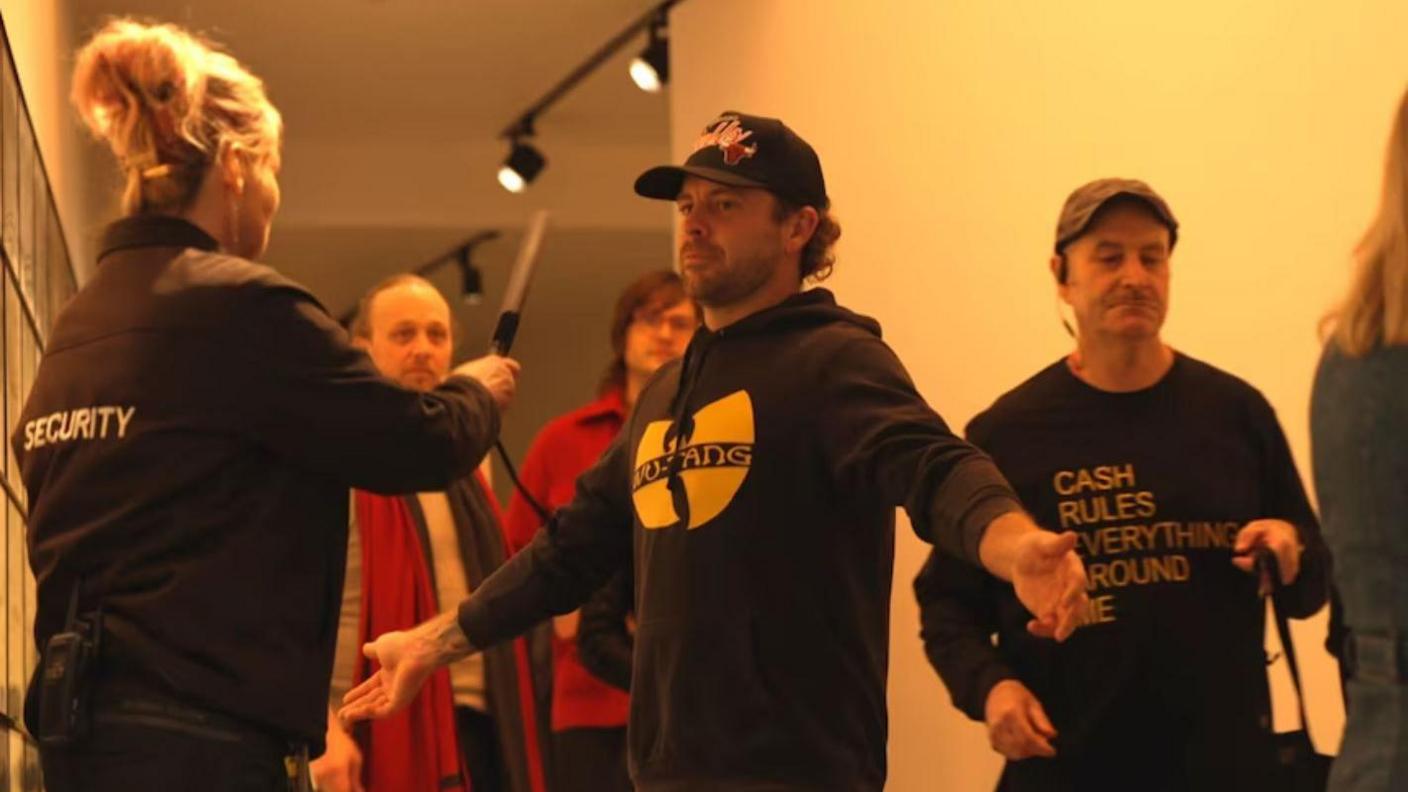
One dedicated fan being screened
Walking into the dimly lit, wood-panelled room the air feels charged – but that could be the storm sounds playing over the speakers.
“Green tea on the left,” a staff member tells me.
In the middle of the room, under a spotlight, is a PlayStation One sitting atop a round yellow table.
Weaving between pleather bean bags – also yellow – to plonk himself in the front row is a man wearing merch from a Wu-Tang 25th anniversary concert at the Sydney Opera House six years ago. He’s with his partner, who I later catch mid bean-bag-boogie. I make a mental note to find them later.
As I take my seat in a black wiry chair, I clock several security guards.
A gong rings, and then silence, as a man with gloved hands walks to the front of the room. Swinging his arm in an exaggerated arch, he presses a button on the PlayStation, and then slips the CD inside. In equally dramatic measure, he picks up the controller and hits play.
A member of the group – I’ve not studied hard enough to work out which – tells us to “sit back, relax… and listen”.
“The saga continues,” he says, as they launch into the first song.
It has oddly soothing choir-like backing vocals, but as the minutes tick by, they give way to significantly less soothing seagulls and sirens. I hear the staccato of actual gunshots alongside synth piano, strings that would be at home in a dramatic James Bond score and a riff by some brass instrument which I’ll spend days trying to get out of my head.
Formed in Staten Island in the early 90s, Wu-Tang Clan is famous for a unique flavour of hip-hop which revolutionised the genre - but they’re also known for their violent and sexually explicit lyrics.
This record is no different.
Inside the leather-bound lyric book that accompanies the physical album you’d find plenty of references to sex and marijuana, and the classic Wu-Tang themes of money and toil, youth and crime are ever-present.
And on the topic of namedropping, everyone from Tommy Hilfiger and Tina Turner to Rapunzel and Harry Potter gets a shout out.
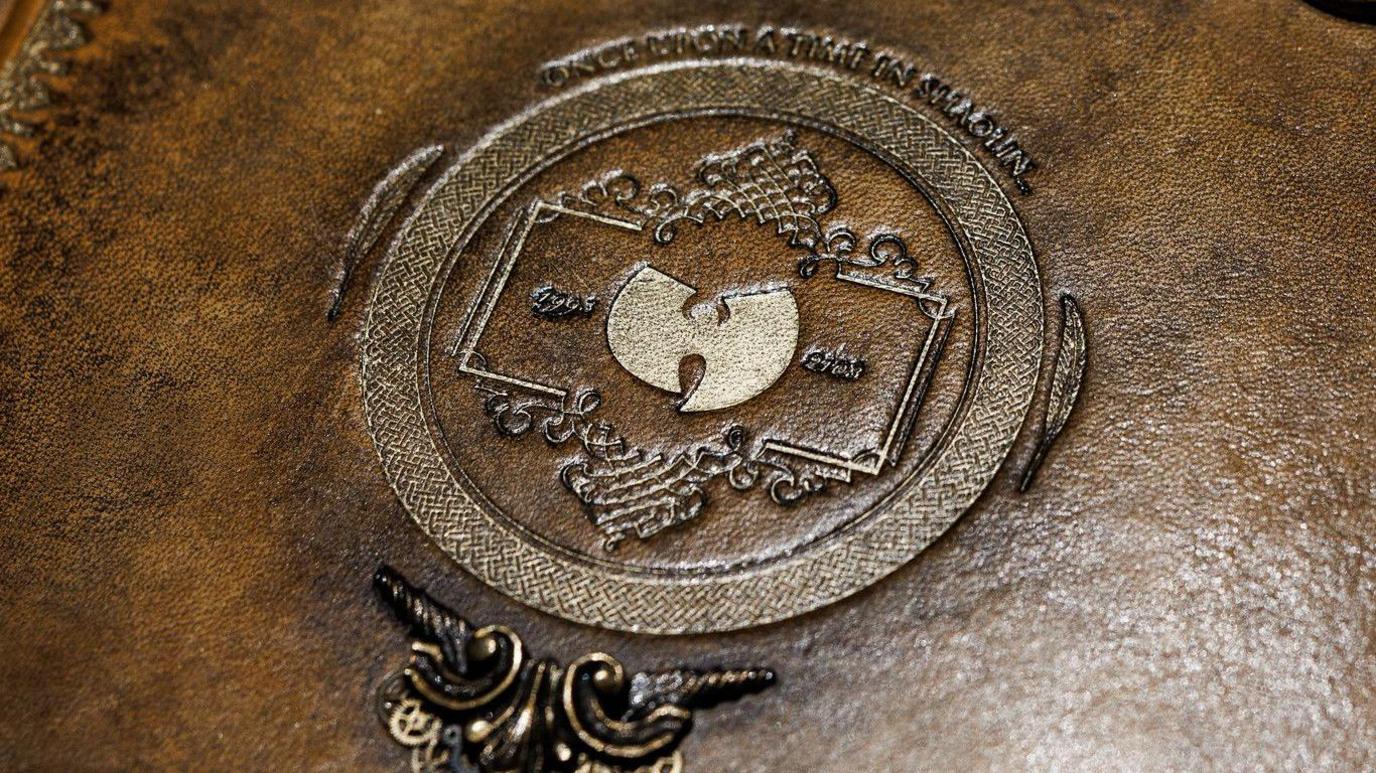
A close up of the leather lyric book
Behind the glass at the control deck, technicians are mixing the music live – adjusting the levels for each song’s attributes. One man looks over their shoulders approvingly, bobbing his head like a rhythmically talented chicken.
Here on my side of the divide, some people reverently sit with their eyes closed while others stare at the ceiling. Many tap fingers on their cups of cold tea.
Suddenly, the gloved man is back. He again walks to the front of the room in silence. Removing the CD, he slips it into a nondescript plastic case and walks to a safe, flanked by security guards.
When the album is safely locked inside, there’s a smattering of applause, and everyone files out of the room.
Initially, I’m overwhelmed. I don’t think I’ve ever heard so many words in my life. I feel like I’ve been assaulted by a dictionary.
I have just as many questions walking out of the studio as I had going in – maybe more. Was that a flute? In a rap song? What exactly was the message of the lyrics? Who was singing what?
And most importantly, where was the Cher cameo I was promised?! Was the curator messing with me?
I ask some of the journalists I’m with if they heard her. We all look confused. “Maybe she was on keys?” I say.
I single out Wu-Tang Merch man, whose real name is Al Maguire. But if you think he’s buzzing now, you should have seen him in the moments before the “funky tunes” rang out.
“[I felt] like I needed to pee.
“The first three minutes I was just trying not to cry.”
He’s already sad he won’t hear it again, he says.
Superfan Jenna Willson is similarly emotional when I catch her, decked out literally head to toe in Wu-Tang tributes.
She gallantly takes off her jacket in single digit weather to show me a tattoo on the back of her neck, a t-shirt from the Opera House show that apparently everyone here but me attended, and then the pièce de resistance – Wu-Tang Clan crocs which she wore to her wedding.

Jenna Willson...
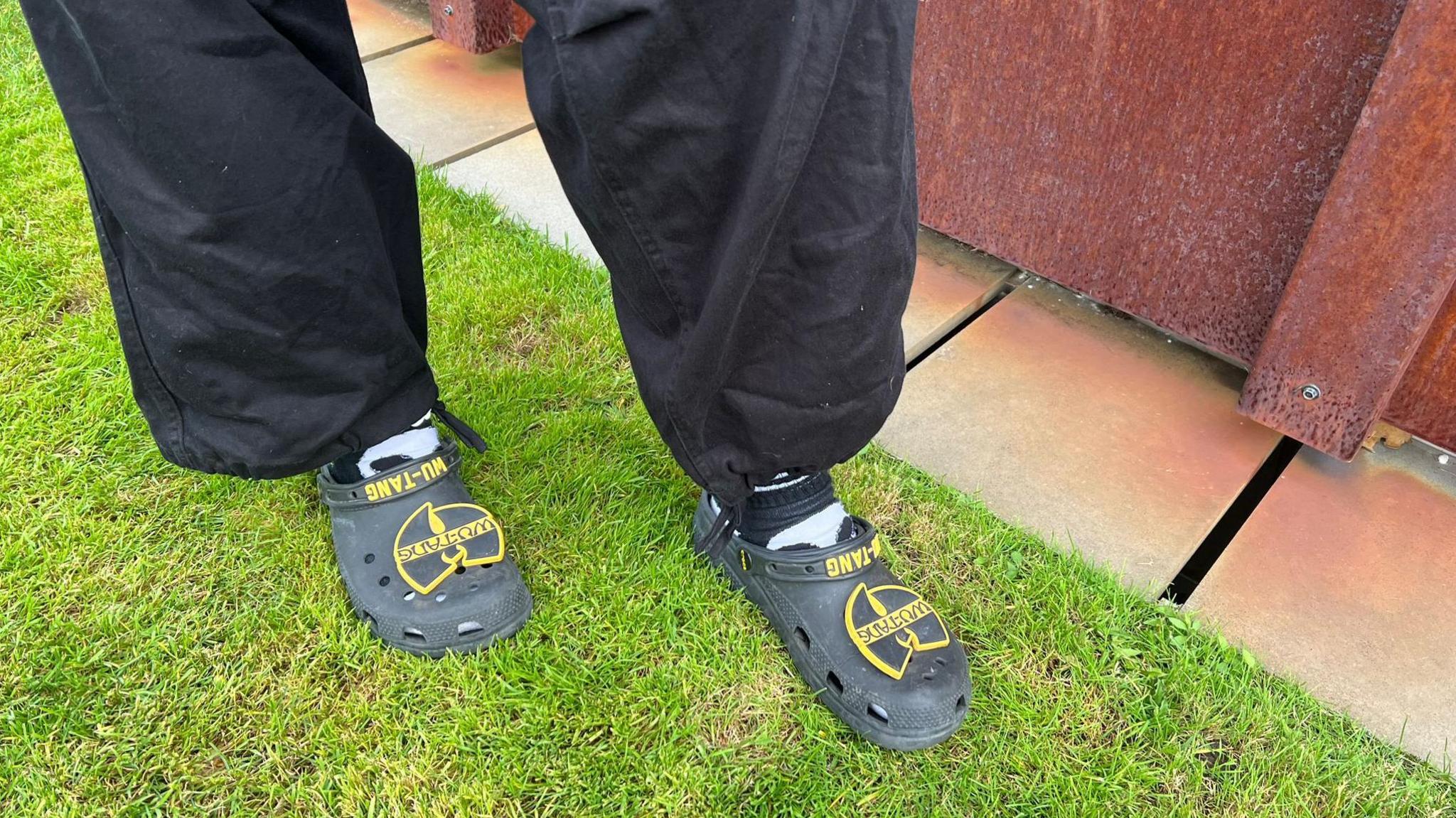
and her fancy footwear
“I don't know how everybody was just sitting down, nodding their heads. I was about to lose it. It was so good… Classic Wu-Tang.”
Another man I stop isn’t feeling chatty. He admits to feeling a little like an imposter – something I find relatable. He says he’s not even really a Wu-Tang fan.
Lateisha Canning, though, will happily admit why she’s here.
“You could say bragging rights,” the 21-year-old tells me as she lines up with her partner.
“I don’t know anything about them.”
By the time I see them on the way out, Wu-Tang has two new fans.

Briggs gave the album a thumbs up
But if anyone is qualified to offer a review, it is self-described “international heartthrob and agitator” – better known as Australian rap heavyweight, Briggs.
His verdict? “It’s a very cinematic record. The production was cool. Great verses.”
He explains Wu-Tang Clan was a big part of his childhood and their influence wove its way into his artistry – he feels like he’s been part of hip-hop history just by listening.
Asked what he thinks should happen to the album now, he laughs. “I don’t care what happens now, I’ve heard it. You can do whatever you want.”